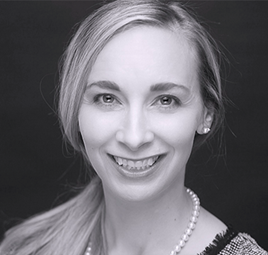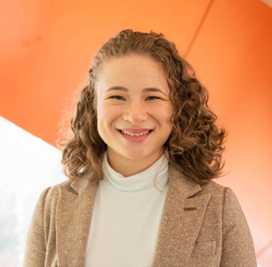
Dr. Christen Russo is an attending orthopaedic surgeon and associate professor at Columbia University Irving Medical Center (CUIMC). She specifically focuses on pediatric orthopaedics, and outside of the clinic she has established herself as a prominent leader and mentor within the orthopaedics community. Dr. Russo graduated from Georgetown University with a B.A. in English Literature & Literary History, after which she earned her M.D. at SUNY Downstate. She completed a general surgery internship at Brown University followed by orthopaedic surgery residency at SUNY Downstate and pediatric orthopaedics fellowship at Morgan Stanley Children’s Hospital/CUIMC. In addition to her clinical and university positions, she currently serves as the President of the Ruth Jackson Orthopaedic Society, an organization that aims to support women and minorities in pursuing careers in orthopaedic surgery.
How did you discover your interest in orthopaedic surgery?
Like so many of us, I was an athlete in high school, and I ended up injured - I tore my ACL when I was seventeen. My brother had also had surgery by the same sports doctor that I saw, and that’s how I was really introduced to the field. I was really interested in athletic training as well, and I was an athletic trainer in college. Through that I started working reallyclosely with an orthopaedic surgeon at Georgetown and he basically told me “You should go to medical school.” So, like many of us my first introduction to orthopaedics was that I thought I was going to be a sports surgeon and I was going to be on the sidelines of games and in the locker room, and my perspective definitely changed by the time I was a resident.
Do you remember any moments when you thought “pediatric orthopaedics is for me”?
In hindsight, it was always pediatrics. When I was in medical school, if I didn’t go into ortho I would have gone into peds. I was allowed to choose between medicine and peds, and I spent all my time in peds - I did my sub-I in peds, my primary care in peds. I did an intern year in general surgery, and I spent three separate blocks on the peds service, which is probably half of my year, and I really loved it. When I got to ortho, I still thought I was going to do sports. However, I realized that I wasn’t as excited about the day-to-day bread and butter of sports, so I was thinking about what else I could do. I didn’t have a lot of exposure to pediatric orthopaedics until I was a third-year resident, and from that point forward that was what I enjoyed.
Do you feel that representation of women in orthopaedics influenced what subspecialty you saw yourself in?
Ironically, no - which is funny now. I didn’t have a lot of female mentors at all, but I was also never really discouraged by the men that I was working with. My first female mentor was a joints surgeon who worked at one of our affiliate hospitals in my residency program. I didn’t meet anyone who was a woman in peds for a while, and when I chose my fellowship, a lot of the places that I interviewed did not have any women surgeons. Now we have lots, but back then we didn’t. For me it was important to have supportive male allies, which we can never take for granted.
How do you think the field has changed from when you were just starting your training versus now?
When I was applying, the class two years ahead of me at Downstate was 4/6 women, and everyone was talking about it - about how terrible it was going to be. One of the women ended up leaving and transferring elsewhere, and she’s now a pediatric orthopaedic surgeon as well. In my class there were two women, and already fewer people were talking about it than before. Now, things have changed a lot, although it of course depends on where you are - there are still a lot of places in this country that have yet to have their first female resident or have only ever had one. I’m very fortunate now to be at Columbia where our incoming class is 4/6 women as well, and I can tell you that there are no whispers.
What do you tell medical students who ask you for advice about being in those programs that don’t have a lot of women?
You must have really thick skin or have really great one-liners to come back at people with. I think that’s especially true in these programs - you definitely can be the one woman in this program, but your skin needs to be incredibly thick. There are lots of places we hear from at RJOS that write to us saying “we really want women here, how can we get them, can you help us” and then there are other programs that have no interest in trying to change things at all. If you’re at one of the programs that has no interest in you being there, there are going to be comments about you that have nothing to do with you but have to do with the fact that you are a woman. If you’re up to it, be the lighthouse for the next person that’s coming and make it more accessible to other folks to be there.
What motivated you to become involved with RJOS?
One of the main things that motivated me was the lack of mentorship that many students, not only women, face. When I went to medical school, there were not a lot of great mentoring opportunities especially in orthopaedics. So, when I got involved with RJOS I joined the mentoring committee. I became the chair of the mentoring committee and from there went to the presidential line. At the beginning of my 5-year track in the presidential line, I started to think about what I wanted my legacy to be, and I really wanted every medical student to know that RJOS existed. We have taken steps to get there - just before I started my presidential year we started piloting local medical student chapters for RJOS, and we launched that nationally during my presidential year.
If you could give any one piece of advice to students who are on the fence about orthopaedic surgery, what would you say?
Just do it! Take action - orthopaedics is all about taking action, and it starts with what you can do right now. If this is something you want to do, don’t let anyone hold you back, and certainly don’t hold yourself back. The people that I think are going to succeed moving ahead in orthopaedics are the people who are confident. They cold-call or cold-email me and say “I want you to be my mentor” or “I want you to be involved in my project”, they come prepared for a conversation, and then they follow through on it. That’s what orthopaedics is all about, it’s picking up a drill and making the next move that’s going to change someone’s life and being able to deal with the consequences afterwards - the risks and the benefits of that. That starts from the moment you decide to talk to somebody about orthopaedics.
What do you enjoy doing in your free time?
Well, if I had a full free day, I’d wake up and workout for 90 minutes and then have breakfast and coffee and do the crossword puzzle, maybe go to the museum, and read. Free time is a little more complicated now, since my kids are small - they’re 7 and 5. This is the time that they still want to hang out with me, so I like to spend a lot of time with them. I have maybe five more years before my daughter maybe doesn’t want to dress like me anymore. I think you must really look at everything and figure out what at this moment in time is most important. Being able to be there for my kids currently is my priority, whether that’s at their events or just doing the things they want to do. My daughter is really into Harry Potter, so I do a lot of reading with her or other crazy Harry Potter things.

About the Interviewer: Jennifer Kunes, MS4
Jennifer Kunes is a fourth-year MD candidate at Columbia Vagelos College of Physicians and Surgeons. She grew up in Boston and attended Harvard University for her undergraduate education, studying Biomedical Engineering with a minor in English literature. She then spent a gap year at Brigham and Women’s Hospital, studying focused ultrasound neuromodulation and three-dimensional bioprinting. Both her background in engineering and her experiences as a coxswain on the varsity Men’s Heavyweight Rowing team led her to begin her path toward a career in orthopedics. While at Columbia, Jennie has worked to bolster educational resources and opportunities for mentorship for other medical students on both the local and national level, serving as Resource Development Coordinator for the Association of Women Surgeons national medical student committee and working to roll out the creation of the medical school chapter program with the Ruth Jackson Orthopaedic Society. In her free time, Jennie is teaching herself leatherworking and shoemaking through YouTube videos and enjoys spoiling her cats, Moose and Fox.

